The Benefits of Quartz Worktops
the worktop of choice for homeowners
modern, durable and easy to maintain
Constantly on show and often in use, it is important to choose the right worktop to perfectly suit your kitchen and lifestyle. In this article, we take a look at the benefits of Quartz worktops. Quartz surfaces have been increasing in popularity for the last decade, and there are no signs of this popularity slowing down.
Quartz worktops are non-porous, hard wearing, resistant to heat and scratching, and do not require sealing, making them very low maintenance. Together with their aesthetic advantages, the durability of quartz has meant that this has become the kitchen worktop of choice for many homeowners.
what is a quartz worktop?
A quartz worktop is a worktop made of quartz which is a man-made stone, engineered typically using 93% natural quartz crystals which are extracted from natural deposits from around the world via mining. These crystals undergo processing, where they are crushed and ground to achieve a range of textures, from fine to more coarse aggregates. Together with various resins and polymers they create a wide range of finishes.
One of the benefits of quartz worktops is that by using quartz leads to a final kitchen worktop that is not only strong but also beautiful and sleek.
Thanks to its non-porous properties, quartz does not absorb liquids that are common in kitchens and bathrooms. Problematic liquids for natural stone surfaces include water, oils, wine, juices and soap, making quartz a more hygienic alternative.
Quartz worktops are also easy to keep clean and looking as good as new, as they simply require a damp cloth and a mild detergent. This makes quartz the perfect choice- offering the look of marble or granite, if desired, but without many of the drawbacks.
what are quartz worktops made of?
Quartz is a naturally occurring mineral which is commonly found in igneous, metamorphic and sedimentary rocks. Since quartz is one of nature’s hardest materials, the weaker surrounding minerals will weather and erode at a quicker rate. As a result, over time quartz is left as the predominant mineral in weathered sediment systems such as beaches.
While quartz surfaces may have a natural appearance due to advances in modern technology, the surfaces are actually man-made. It needs to be bonded with resin or binders to become usable and form an extremely durable artificial stone that is scratch, heat and stain resistant.
The composition of quartz kitchen worktops can range from 90% to 95% quartz. High quality surfaces such as CRL Quartz are composed of an optimum ratio of around 93% natural quartz and 7% polymers and resin, along with various types of pigments for colouration.
The resin cures to form polymers, a long repeating chain of molecules. If the resin content in the mixture is too high, it can cause problems during installation as it will absorb water, resulting in slab expansion. The higher the resin content, the more porous and less scratch resistant the slab will become. However, if the quartz content is too high, the slab can be brittle and have less stability. That’s why the correct ratio is so significant to ensure consumers get the most of out their beautifully engineered stone for their kitchens and bathrooms.
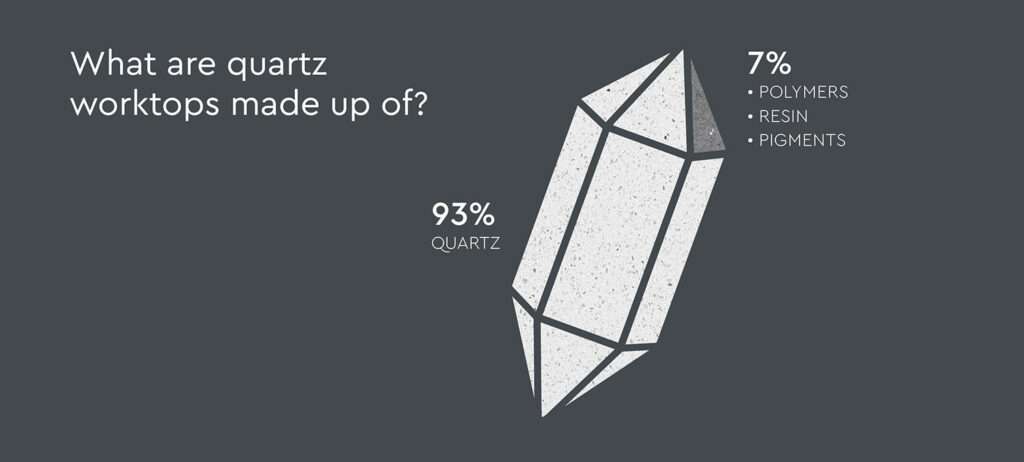
how are quartz worktops made?
In 1963, Breton, a company in the northeast of Italy, developed engineered stone and licensed the process to more than 50 companies around the world. While manufacturers add their own flair and twist into their quartz kitchen worktops, the basis of the manufacturing process has remained the same.
For CRL Quartz surfaces, before the whole process is begun, each and every material is carefully inspected by quality control. Raw quartz is crushed and then blended together with polymer resin using industrial mixers.
Quartz worktops can be highly customised, so depending on the desired finish, sometimes the materials may be mixed through several mixers if there are multiple colours in the mixture. The manufacturing process will differ slightly depending on the colours that need to be achieved, but the end result will still be the familiar quartz material.
Once the mixture is properly mixed, it is poured into a mold of the countertop. The mixture is then vacuumed to remove the air, then compacted into slabs with a pressure of 100 tonnes. The slabs are then cured in a kiln, an industrial oven that heats the quartz at very high temperatures to solidify the mixture into a hard surface. Curing the slab increases the strength and resistance to stains. To finish off, the slab surface is polished to a perfect glossy touch. The resulting product is a durable artificial stone without cracks or pores. Each slab is quality inspected before being packaged and ready for shipping.
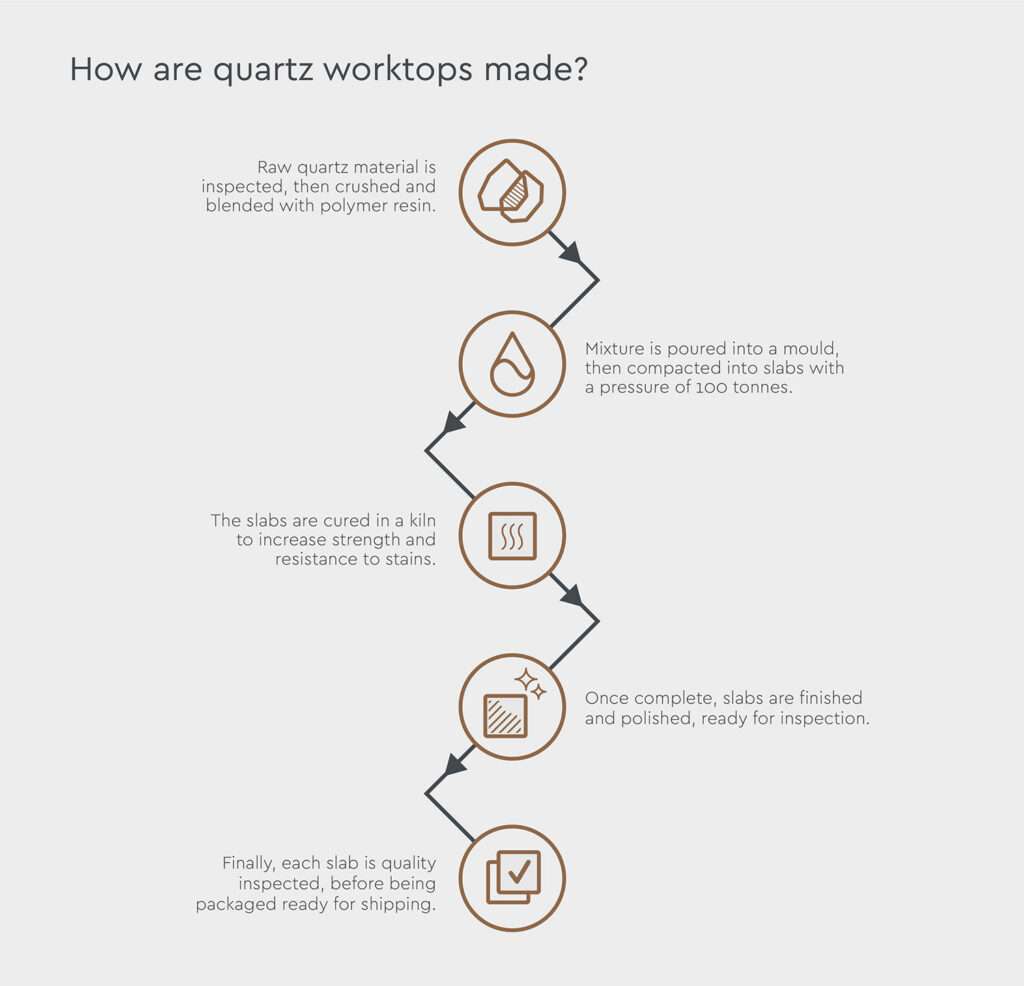
how hard is quartz compared to other materials?
According to Moh’s Scale of Mineral Hardness, quartz is rated 7 – making quartz one of the hardest naturally occurring minerals on earth. It’s much harder, stronger and more durable than other countertop stones such as granite, which is rated 6.
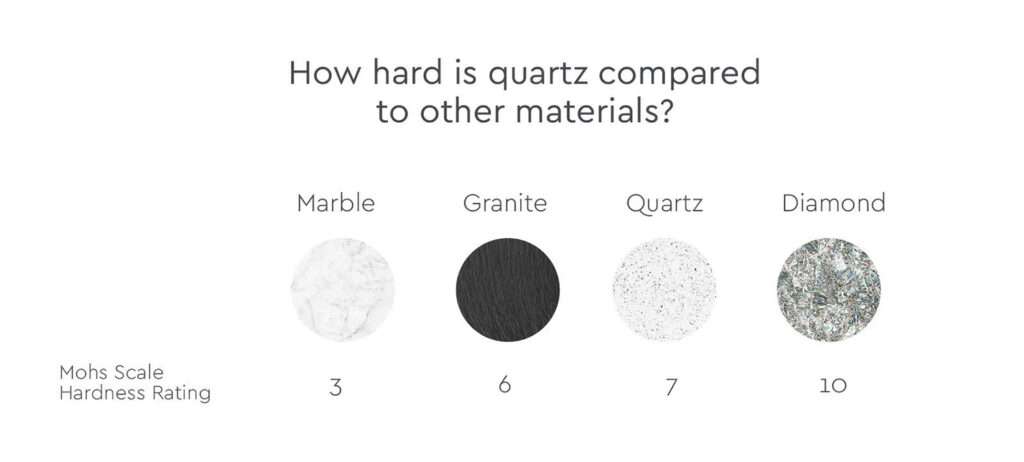
For more information about the benefits of quartz worktops, check out our infographic here.
how durable are quartz worktops?
Due to the way they are engineered, our quartz worktops have a durability that is normally superior to that of natural stone. They are not only stain and scratch resistant but also resistant to heat and impact.
This durability is reflected in a warranty period of 25 years.
Quartz worktops offer an ideal, hard wearing choice for beautiful, luxurious family kitchens and bathrooms, without the high maintenance level required by natural materials.
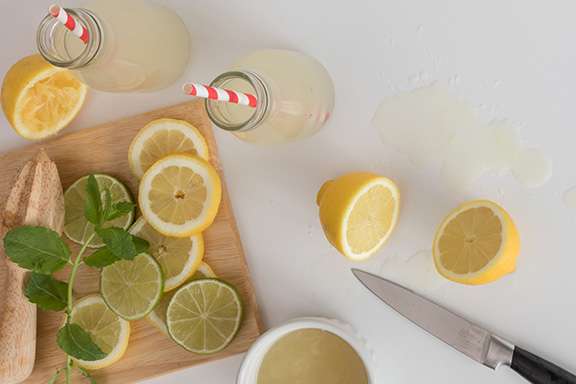
quartz vs. granite worktops
Natural stone surfaces such as granite have long been a popular choice when it comes to beautiful and traditional interior design.
However, granite comes with limitations: it is only available in the colours that nature has to offer, so the range of colours and variations are much less than those offered with quartz worktops, significantly reducing options when it comes to kitchen design.
While granite is also a solid surface, it requires a higher level of maintenance than engineered stone, including the need for a sealant to be applied annually.
quartz vs. granite worktops key feature comparison
| CRL Quartz | Granite | |
|---|---|---|
| Resistance to wear & tear | ||
| Scratch resistance | ||
| Stain resistance | ||
| Heat resistance | ||
| Impact resistance | ||
| Flexural strength | ||
| UV resistance | ||
| Pattern consistency | ||
| Easy to clean & care for | ||
| Hygiene |
- Excellent:
- Very Good:
- Good:
- Low:
- Very Low:
quartz vs. marble worktops
As with granite, marble is a popular natural stone and each slab is unique in its colour and marbling.
Marble is also a softer material than quartz, making it more vulnerable to scratches and stains. As with other natural stones, marble will need a sealant applied each year as protection.
A marble worktop can offer a traditional elegance but, due to the uniqueness of the pattern on each slab, it doesn’t offer the same consistency of colour or appearance as a quartz worktop, which can be a real problem when viewing a marble surface in a kitchen showroom at another kitchen worktop supplier. It can often be the case that the worktop fitted in your home is significantly different to one that has been viewed as an example.
quartz vs. marble worktop key feature comparison
| CRL Quartz | Marble | |
|---|---|---|
| Resistance to wear & tear | ||
| Scratch resistance | ||
| Stain resistance | ||
| Heat resistance | ||
| Impact resistance | ||
| Flexural strength | ||
| UV resistance | ||
| Pattern consistency | ||
| Easy to clean & care for | ||
| Hygiene |
- Excellent:
- Very Good:
- Good:
- Low:
- Very Low:
why should you opt for a quartz worktop?
Not only do they boast many advantages which are ideal for virtually any kitchen and bathroom design or function, quartz worktops are also available in a wide range of finishes and textures- from plain white, through to marble or concrete effects, offering you more choices than other natural stone surfaces.
Being a man-made kitchen worktop guarantees much higher quality and more consistency in colour and appearance, as opposed to natural products which can often differ in colour, veining and overall appearance.
Due to its unique resistance to moisture, bacteria and germs cannot permeate into a quartz worktop in the same way that they can with natural stone worktops.
the versatility of quartz
Quartz kitchen worktops can be customised to mimic granite or marble. Homeowners can still experience the aesthetic and liveliness of natural stone without the maintenance hassles. Quartz is more durable than granite and has a guaranteed longevity of around 25 years. The non-porous nature of polymers used prevents the build-up of bacteria and mould, so no special cleaning products are needed. It’s also one of the most hygienic surfaces available for kitchen spaces. There are none of the staining issues that are associated with marble and granite countertops – the surface only needs to be wiped down to prevent stains from setting in.
While quartz can be the most expensive work surface out of the three stone countertops, it can also increase the value of your home, making quartz a popular choice and a great investment for kitchen renovations. Quartz countertops are available in endless styles and colours to fit your ideal kitchen design. However, if you prefer imperfections, the beauty of distinct colour variation and veining found in granite and marble cannot be replicated.
We always highly recommended quartz as your countertop material of choice. When you compare quartz countertops with granite and marble, quartz is the clear material winner. Whilst it will provide you with much of the visual benefits of either granite or marble, it comes without many of the flaws or drawbacks.
quartz comparisons
quartz compared to concrete
Most concrete worktops are chosen with the aesthetic qualities in mind, with less thought put into the care and maintenance elements. While concrete worktops boast that they are manufactured to last for many years, most customers find they are prone to staining and require frequent maintenance to keep up with the wear and tear of simple every day use. At CRL Stone, we offer concrete effect worktops which offer the minimalistic and modern look of real concrete but with all the additional benefits that come from buying quartz.
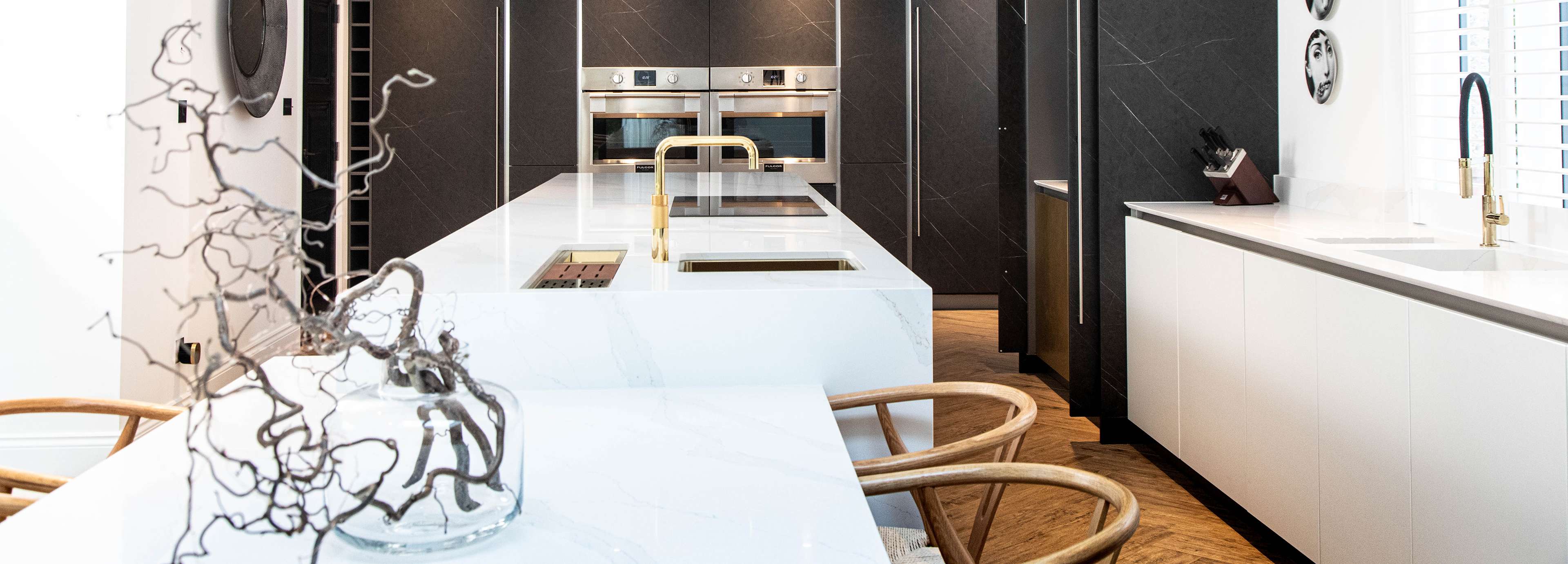
quartz compared to wood
Solid wood countertops have been a kitchen staple for decades now, nothing gives a kitchen a warm, welcoming feeling quite like them. Although the look can be considered timeless, the material has not kept up with its competitors when it comes to functionality. Their porous nature means they are more susceptible to bacteria even if they are sealed regularly. They are also more like to scratch and scorch if care is not taken. Due to the manufacturing process the worktops at CRL Quartz undergo, these negative qualities of wood countertops are not shared with quartz ensuring the same rustic feel can be hassle free.
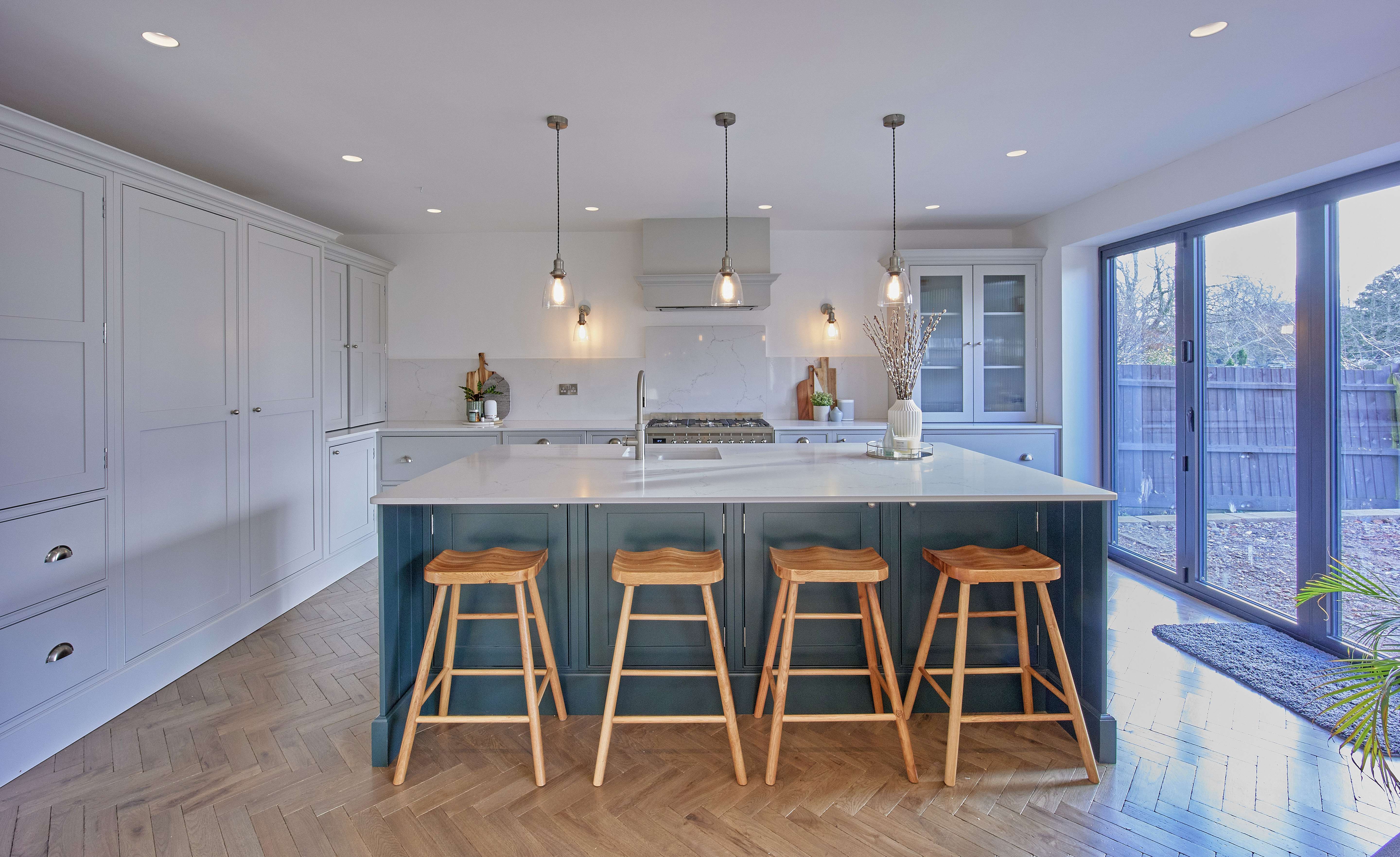
quartz compared to stainless steel
Stainless steel is commonplace in commercial kitchens, and while it may not be everyone’s first thought for a home kitchen, that has not stopped its domestic popularity from increasing in recent years. While stainless steel’s durability and bacteria resistance qualities can not be understated it has been shown to be prone to scratches and dents. CRL Quartz have been working to create worktops that offer the same level of durability as stainless steel, in addition to being scratch and dent resistant. We offer a large selection of neutral colours: including darker greys and blacks – ensuring that the industrial style that comes with stainless steel can be recreated in any kitchen.
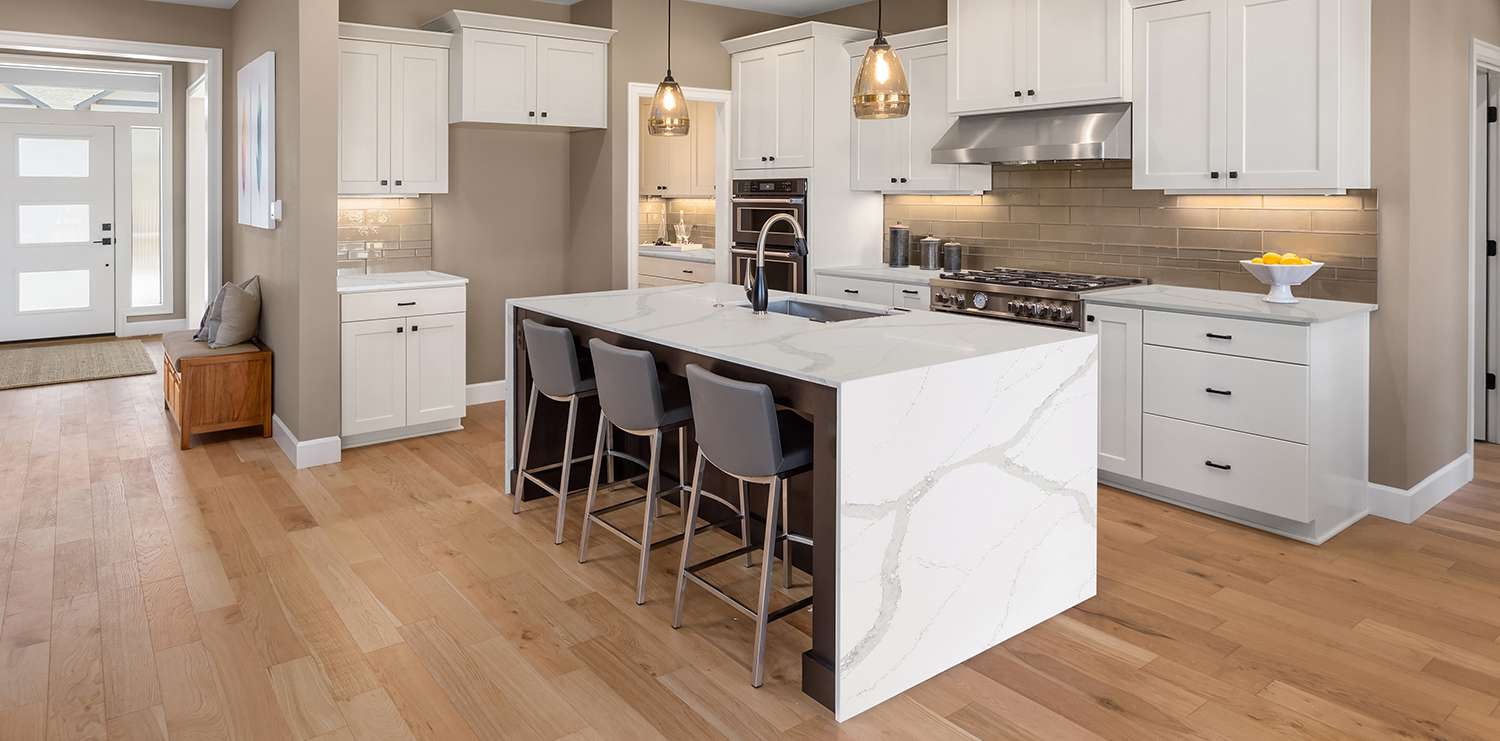
quartz compared to glass
Glass Worktops have quickly become a more mainstream trend and are now in popular demand amongst homeowners. Initially, glass may sound like a more niche choice however, the increasing range of colours and finishes available is opening it up to a wider range of tastes. Glass is becoming a true competitor to quartz as it offers many of the same physical properties. It’s equally dense, strong and non porous – making it extremely low maintenance. However, glass worktops suffer from having very limited style options. Although there are more colour and finish options becoming available for glass surfaces, they will only ever suit a certain type of kitchen.
Quartz as a worktop is a much more versatile option. It boasts all of the same durable qualities, but can be made to fit any style of kitchen. Whether it’s a rustic, industrial look or a more sleek and modern feel – Quartz can be made to fit any style.
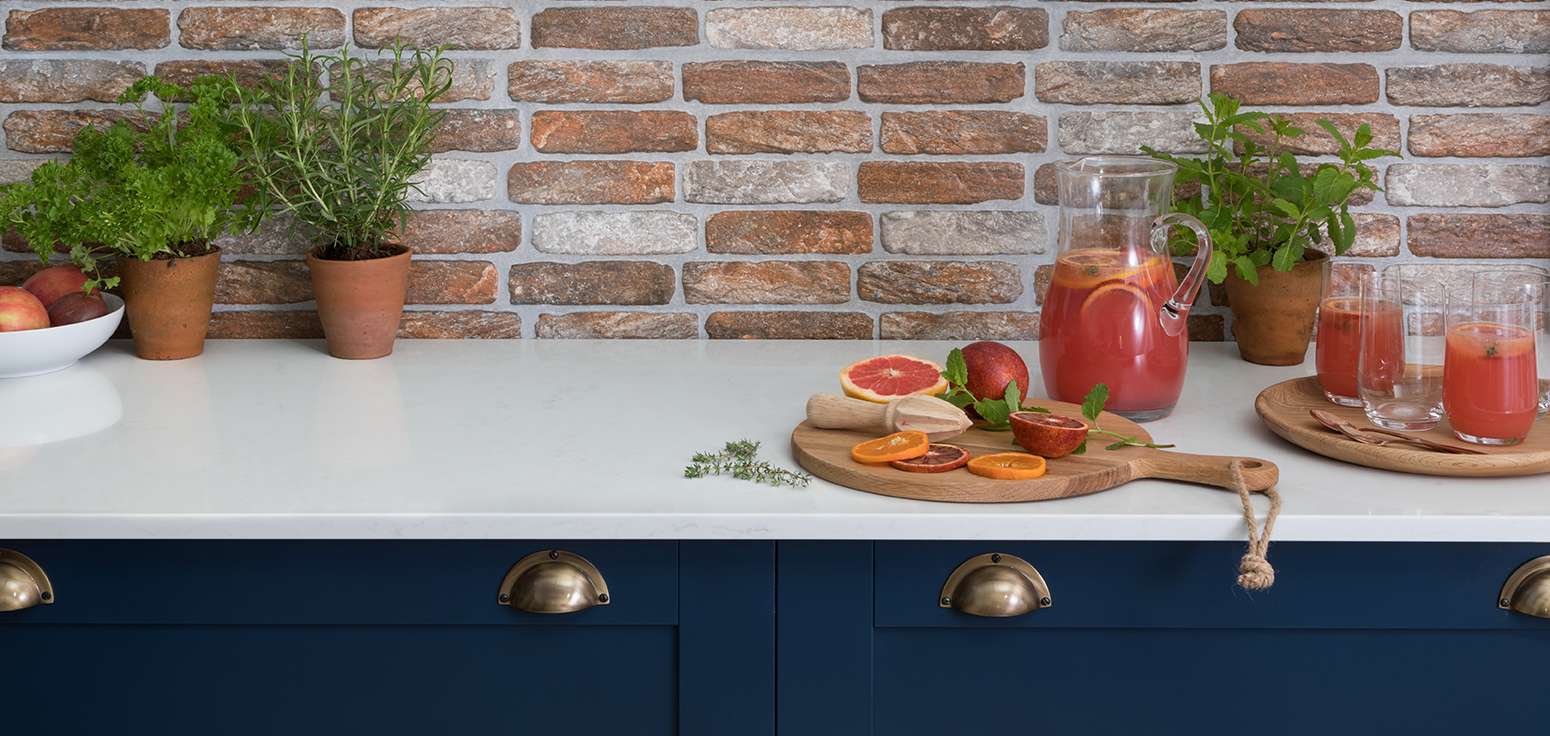
quartz compared to laminate
It should come as no surprise that laminate worktops make up the majority of kitchen worktops these days. Usually made of a wooden, chipboard centre, which is wrapped in a decorative layer to create the external surface, it can fit multiple styles. Despite the cheaper materials being used, laminate worktops actually make for a very hygienic and durable worktop. Damage can still occur however; they risk swelling due to water ingress and despite being relatively scratch, stain and heat resistant the layers can begin to peel with wear and tear.
CRL Quartz worktops offer an upgrade from laminate worktops in every sense. Available in an equally wide variety of styles yet boasting a product guarantee over twice the length of time that an average laminate worktop can last.
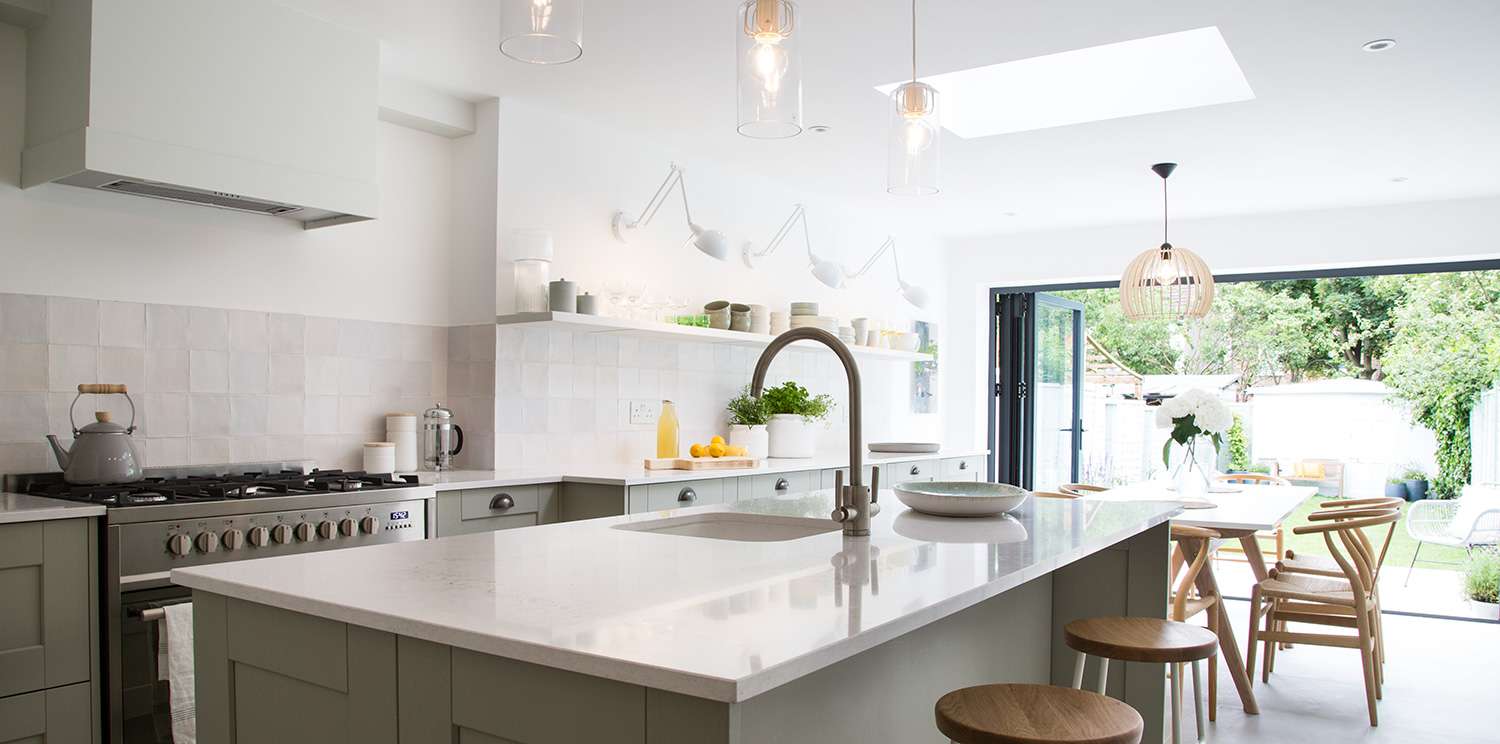
read our quartz worktops FAQ
most popular questions:
Because of the hardness of natural quartz, engineered quartz provides worktops that are hard-wearing, stain, scratch and heat resistant.
Their non-porous properties mean that they are very hygienic as the build-up of bacteria or mould is prevented and food can be placed in direct contact with the surface which helps keep your family safe.
Quartz surfaces are more resistant to wear and tear than natural stone surfaces, such as granite and marble. As it is a man-made product, it combines extremely hard quartz minerals (one of the world’s hardest minerals) with high quality resins, polymers and pigments to give it its renowned strength and resistance to stains, scratches, heat and impact.
On the other hand, granite and marble are natural materials taken straight from the ground which means that it means that they come with its natural weaknesses including a lower resistance to stains, scratches, heat and impact. Whilst quartz surfaces never need to be sealed to keep their properties, granite and marble worktops require a higher level of maintenance to keep them performing to their best.
A new kitchen is a big investment, so it is natural that you want to make sure you choose the right worktop for your needs. As the quartz used for the worktops is man-made, they are available in a wide range of colours and all slabs of a specific colour can show the exact same pattern. This provides you with a consistency throughout your work top that is not always possible with a natural stone.
As granite and marble are natural materials, each piece is different, making it a more “unique” worktop which may be considered a benefit to some, but a drawback to others as you will not fully know what your kitchen really looks like until the worktop is fitted.
We provide a warranty for added peace of mind. Don’t forget to click here to register your worktop and activate your warranty as soon as possible once it has been installed.
Thanks to their non-porous properties, CRL Quartz surfaces are highly resistant to stains.
However, do not allow dirt and residue such as stubborn food or gum stains to harden and remain on your kitchen worktop for an extended period of time. If this should happen, scrape away gently using a small blade or putty remover before cleaning the surface with warm water and soap.
For stubborn or dried on spillages, use a non abrasive cleaning pad combined with a small amount of mild soap or specialised stone cleaner.
Recommended stain remover: Bar Keepers Friend Power Cream.
Hundreds of kitchen showrooms in the UK and Ireland have one or several CRL Quartz displays which are available for you to view. Contact us with the quartz worktop you would like to see and your postcode and we will advise the nearest showroom to visit.